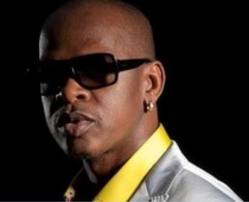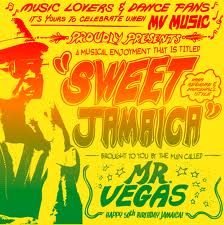By Mel Cooke—-
By virtue of its title Sweet Jamaica, the double CD released by singjay Mr. Vegas in late May, is appropriate for the country’s half-century of Independence year. It does not hurt that in mid-June, Complex Magazine ranked it at 34th of the best 50 albums of theyear to that point. That added to a Billboard Reggae Charts debut at number seven earlier in June.
Now, as the summer music season literally heats up, Mr. Vegas is plugging away on the concert circuit, pushing not simply a set but the next stage of his career.
He tells The Sunday Gleaner candidly about his desire for longevity – not that he is doing badly so far; after all, his breakout Heads High was well before the turn of the millennium.
To achieve that longevity, he knows he needs lasting material, which he and producer Mikey Bennett believe they have on the double disc Sweet Jamaica – especially the reggae one which Bennett produced and has covers such as You’ve Made Me So Very Happy, Sweet and Dandyand Take it Easy.
On the strictly dancehall side of things, there is Bruk it Down andBeautiful Life, among others.
The 30 tracks are presented in throwback dancehall packaging – a classic look to what Vegas hopes will be a lasting set.

“When Mikey Bennett came to me with the idea of just going in a different lane with songs like Sweet and Dandy and Take it Easy, we just instantly felt the connection. That him was trying to connect Mr Vegas to where the music was coming from, how he could hear Mr Vegas singing some of these songs. It just took me back into the days of Jimmy Cliff and Barrington Levy and that vibe. So the whole concept of the album as we started working felt like the whole history of our music coming up,” he said.
It went beyond music to visuals, as Vegas said it became “how I envision seeing dancehall posters, with the man putting up the posters with the flour”. He remembers going to Skateland in Half-Way Tree and reading dance posters “and look if I see Stitchie name, Papa San name”.
That was in the late 1980s into early 1990s. Now, Bennett notes the same process of observation in Vegas, along with constant analysis and the willingness to discard or revisit his own work when he feels it is substandard.
“He is the person with the idea that process it inside and outside. So in other words, when you and him have a conversation at 7 o’clock in the evening, you can, almost expect a phone call at 2 in the morning and him say, ‘Listen, you know what I think?’,” Bennett said.
More than that, though, Bennett recalls watching Vegas perform at an event, turning to someone and saying “you know, this is one of the voices of Jamaica”.
“In other words, Vegas has one of the people’s voice,” Bennett said. “Is probably not one of the classic, melodious kind of voices, but it bypass the ears and just go straight inside the heart.”
Vegas considers his memorable voice an asset and notes that, from the earlier days, “I can’t do a performance, especially outside Jamaica, without doing Heads High.”
Enhances the song
Each freely expresses his faith in the other in particular aspects of music production, Vegas recalling instances when Bennett calls for additional input which enhances the song and “I didn’t hear that – that is what these great producers do”. On the other hand, Bennett speaks about requesting Vegas’ presence in the studio, to get his reaction on certain projects for other artistes.
“There are some people I trust for certain things. I trust Vegas for the streets,” Bennett said.
There came a time when Vegas found a renewed trust in himself as an artiste with longevity, setting the framework for a project like Sweet Jamaica. “As a dancehall artiste, when you realise you are doing concerts and you’re performing on the same show with Rita Marley and the Marleys, Toots Hibbert and Beres and these great artistes – I remember doing a festival in Belgium. The promoter was keen on me closing the festival. Buju and everybody was on the festival and these great reggae artistes,” Vegas said.
When he did not want to close, the promoter insisted that “the people want you to close the festival”. He did and Vegas said “that was when I said you know, these people standing around all night waiting to hear Mr Vegas then I have to make a career – I have to create a different lane now, where I not just running up and just jumping up for hour, hour and a half”.
That was in 2009 and it was a defining period. “That is when you realise you have to grow up and you have to mature and you have to start having some songs and perform like an Alpha Blondy,” Vegas said.
“I remember the first time I went to Belgium and Alpha Blondy was on the same show. The man los’ me. The man perform for like three hours and people were eating out of his hands. And I was just standing backstage and saying ‘you know one day mi haffi do dat’.”
The Sunday Gleaner asks if this means Sweet Jamaica is motivated strictly by commercial concerns and Vegas says that, on the contrary, it is a risk, funded largely by Bruk it Down.
It is, however, a risk with lofty ambitions, as Vegas said “I want to get to the level of a Barrington Levy, who has not had a hit song in quite a while, but every time I am on the road I see him coming from somewhere with his band. I am trying to be an artist where in a few years when somebody call Mr Vegas for a show it is a festival. It is a performance”.
And Bennett said “Vegas has the potential to offer to the audience an experience that them going to remember, across all age groups”.





You must log in to post a comment.